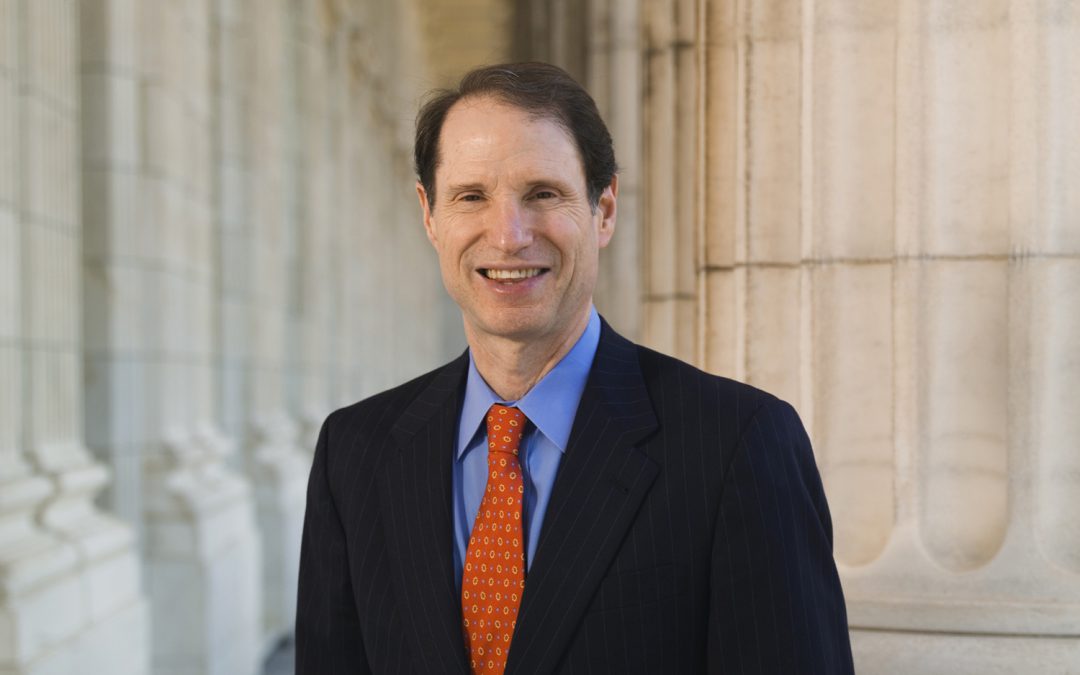WASHINGTON — Sen. Ron Wyden sat in a wood-paneled hearing room of the Hart Senate building as he grilled Director of National Intelligence James Clapper. It was March 12 2013, just months before Edward Snowden revealed the government’s mass surveillance of Americans, and Mr. Clapper continues to deflect Wyden’s questions.
Senator Wyden’s time was up but he fit in one last question: “Does the NSA collect any type of data at all on millions or hundreds of millions of Americans?”
Clapper responds, “No, sir. … Not wittingly”
But three months later, Mr. Snowden’s initial National Security Agency leaks began appearing on the front pages of The Washington Post and The New York Times, directly contradicting Clapper’s congressional testimony.
On Capitol Hill, Wyden is one of most active voices on digital privacy issues, specifically when it comes to protecting civil liberties. First elected to the Senate in 1996, the Democratic senator from Oregon has served on the Select Committee on Intelligence and worked on bills to reduce and regulate government surveillance and hacking.
Wyden was a leading voice against new amendments to Rule 41 of Federal Rules of Criminal Procedure, which allows courts to grant search warrants for computers outside of their jurisdiction. Wyden tried to delay the changes by introducing a one-sentence bill that would have stopped Rule 41 from going into effect. The Senate failed to act on Wyden’s bill before Dec. 1, and the new Rule 41 was automatically enacted.
“The Senate, made in my view, one of the biggest mistakes in surveillance policy in a long time,” Wyden said after his Senate colleagues failed to pass his measure that would blocked Rule 41 changes.
He said the Senate’s inaction has resulted in a major change in surveillance policy without hearings or public involvement.
“Congress allowed the Justice Department to wave its arms in the air and grant itself new powers under the Fourth Amendment without a single hearing,” Wyden said. “In the digital era Americans don’t throw their Fourth Amendment rights out the window just because they use an internet-connected device.”
Wyden said he plans to continue fighting the Rule 41 change in the next Congress and “pushing for answers about government hacking.”
He is also working on bills to rein in government surveillance from digital location tracking to aerial drone surveillance. Next year, Wyden will be working to close the ‘backdoor’ loophole of Section 702 in the Foreign Intelligence Surveillance Act, which is set to expire then.
Under 702, the government collects communication from overseas foreigners. But many Americans’ communications can also be collected in operations under Section 702, especially if messages between two Americans travels between foreign servers.
Wyden has denounced the NSA for deliberately conducting warrantless searches for the communications of individual Americans and said he is determined to stop the practice.
Wyden “has been influential in not only advocating for Americans’ privacy and civil liberties, but sounding the alarm wherever he sees them being infringed upon,” said Robyn Green, policy counsel at the Open Technology Institute, which is part of the left-leaning think tank New America. Ms. Green called Wyden an important “whistleblower” against mass surveillance.
“Senator Wyden has been one of the strongest supporters of privacy and civil liberties in the electronic surveillance sphere of any of the members of Congress,” said Greg Nojeim, senior counsel of the nonprofit Center for Democracy and Technology. “He’s been extremely effective in shedding light on areas of concern and in stopping bad legislation.”
With a Republican in the White House and the GOP controlling the House and Senate, regulation of surveillance and government hacking likely will be even more of an uphill battle. One particular area that could be a point of contention with the Trump administration is encryption. During his campaign, Trump called for a boycott of Apple after the company refused to create a code for the FBI to break its own IPhone encryption.
“The new administration will be a challenge for civil liberties for Senator Wyden,” Nojeim said. “In particular on encryption, President-elect (Donald) Trump has not signaled an adequate appreciation of the benefits of encryption and the result could be a lengthy period of uncertainty and an increased need for education and advocacy.”
Trump called on Americans to boycott Apple in February until the company built a backdoor for San Bernardino terrorist Syed Rizwan Farook’s cellphone for the FBI.
“The president-elect was very clear about his interests in weakening strong encryption,” Wyden said. “His views with respect to strong encryption, they are wrong from a security standpoint, because strong encryption keeps us safer, they are wrong from a liberties standpoint because certainly your rights will be less secure.”
Wyden has said Trump’s previous behaviors and his positions on surveillance are dangerous.
“President -elect has said he wants the power to hack his political opponents, the same way Russia does,” Wyden said.
Furthermore, Wyden said the prospects of increased ‘secret law’ are concerning.
“The reality is, that for those of us that believe security and liberty are not mutually exclusive, it is possible to have both,” Wyden said.
Secret laws are orders passed by people outside of Congress, such as the President, relating to national security which are kept private. While many intelligence field sources and methods must be kept classified for their safety, Wyden said the laws used in those circumstances must be public.\
“People read the Patriot Act and they didn’t see that the government was going to go out and collect the phone records of millions and millions of law-abiding people. I and others pointed out the flaws in that,” Wyden said. “ I’m very concerned in the new administration about the prospects and growth of secret law and I’ll spend a lot of time on that.”


